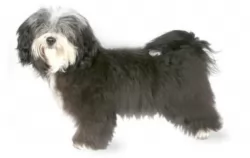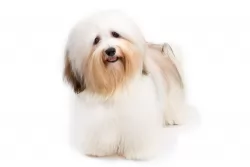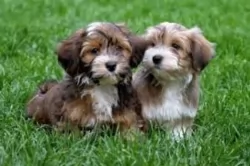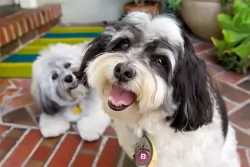 MyDogBreeds
MyDogBreeds Havanese is originated from Cuba but Cyprus Poodle is originated from Cyprus. Both Havanese and Cyprus Poodle are having almost same height. Both Havanese and Cyprus Poodle are of same weight. Both Havanese and Cyprus Poodle has almost same life span. Havanese may have more litter size than Cyprus Poodle. Havanese requires High maintenance. But Cyprus Poodle requires Moderate maintenance
Havanese is originated from Cuba but Cyprus Poodle is originated from Cyprus. Both Havanese and Cyprus Poodle are having almost same height. Both Havanese and Cyprus Poodle are of same weight. Both Havanese and Cyprus Poodle has almost same life span. Havanese may have more litter size than Cyprus Poodle. Havanese requires High maintenance. But Cyprus Poodle requires Moderate maintenance
 The only breed of dog that is native to Cuba is the Havanese. These little dogs are great companion animals. Sociable and happy, they are very popular in the United States with urbanites. These happy little pups are a Bichon type of dog which was developed from the “Little White Dog of Havana” or the Blanquito de la Habana which is now extinct.
The only breed of dog that is native to Cuba is the Havanese. These little dogs are great companion animals. Sociable and happy, they are very popular in the United States with urbanites. These happy little pups are a Bichon type of dog which was developed from the “Little White Dog of Havana” or the Blanquito de la Habana which is now extinct.
The Blanquito de la Habana was itself developed from another extinct breed the Bichon Tenerife. Then the Blanquito was bred with the other Bichons and poodles in developing the Havanese. It is believed that some of the first people to settle in Cuba were from Tenerife, an island close to Cuba. In the early part of the sixteenth century, little white dogs were brought to Cuba with these settlers. This dog of Tenerife is believed to be the ancestor of all Bichon breeds.
At that time trade with Cuba was highly restricted by the Spanish and so these dogs developed without any crossing from other breeds from outside the country. They grew to be able to stand hot temperatures and they grew a very unique coat – almost like silk. Their coat is soft and light, while insulating them from the tropical environment.
At this time Cuba was the place to be for Europeans aristocrats on vacation. Unlike the British colonies, Cuba had theatres, operas and palacious. When going back to Europe, many took this little white dog with them to France, Spain and England. The Dog of Havannah was a favorite on European soil as well. Many of these dogs taken to Europe were fawn or parti instead of white. Meanwhile back in Cuba, the bourgeoisie were replacing the aristocracy who themselves would soon be replaced by the Revolution.
During the days of the bourgeoisie, the Havanese became very popular household pets. The breed has been a family pet for the last 150 years. At the same time the breed was very trendy in Europe with Charles Dickens and Queen Victoria owning several. They were by now familiar participants in Europe’s dog shows. Finally, with the Revolution, the bourgeoisie left the country in droves with their little white dogs. A genetic pool was then formed in the US. Gene pool from 11 dogs. All the Havanese in the world are descended from those 11 dogs with the exception of the dogs isolated in Cuba and the US. Today the Havanese is one of the most popular and fastest growing breeds in the world.
 Unfortunately the Island of Cyprus may well be beautiful and have a wonderful climate, but when you take a deeper look, the island has a serious problem with feral cats and stray dogs.
Unfortunately the Island of Cyprus may well be beautiful and have a wonderful climate, but when you take a deeper look, the island has a serious problem with feral cats and stray dogs.
The many sanctuaries battle to keep up with the volume of neglected and abandoned animals on the island. One of the dogs found on the Island of Cyprus is the Cyprus Poodle. Some people say that the Cyprus Poodle is a cross between a poodle and a terrier.
Today this small dog is sought after in other countries for his loving personality and attractive looks.
 The Havanese is a sturdy little dog, a member of the toy group. They weigh no more than 16 pounds (7.3kg) and his body is longer than it is tall. The breed has a unique topline that is not level, but it is straight. His front legs are longer than his hind legs producing the lively gait everyone is used to seeing with a Havanese. With a full muzzle that tapers to the nose, the Havanese does not seem to be short. The skull’s length is the same as the muzzle’s. The head of the Havanese is round in the back and flat in the front.
The Havanese is a sturdy little dog, a member of the toy group. They weigh no more than 16 pounds (7.3kg) and his body is longer than it is tall. The breed has a unique topline that is not level, but it is straight. His front legs are longer than his hind legs producing the lively gait everyone is used to seeing with a Havanese. With a full muzzle that tapers to the nose, the Havanese does not seem to be short. The skull’s length is the same as the muzzle’s. The head of the Havanese is round in the back and flat in the front.
They have a deep chest, almond shaped eyes that are dark brown and their ears are about halfway down the nose. The long ears hang down the side od the face. They have a long plumed tail that is held high and upward. The standard for the breed and now the laws of the United Kingdom state that there can be no docking of the tail.
 The Cyprus Poodle is such an attractive little dog with his jaunty personality and his dense, curly hair.
The Cyprus Poodle is such an attractive little dog with his jaunty personality and his dense, curly hair.
He stands in the region of 20 to 30cm and can weigh roughly 3 to 6kg. His hair is essentially cream or white with orangey tips and some people claim he is a cross between a poodle and a terrier.
He is a small dog. His curly coat is woolly and can be in a number of different colors such as white, ivory or apricot or even other colors.
The curly haired Cyprus Poodle isn’t a huge shedder but regular clipping keeps him looking nice and makes sure the coat doesn’t matt.
He has floppy ears, a long tail and brown eyes. He loves to go for a swim and then to dart around the place so he may require a bath every now and again to keep his beautiful coat clean and free of matting.
The Cyprus Poodle is an even tempered dog and he makes the perfect family pet, forming close bonds with his human family members.
He is playful, social and friendly and gets on well with children in the home as well as any other pets. He may be a small, friendly dog, but he will need training and socialization if you want him to be obedient and relaxed around other people.
 Havanese are highly intelligent and eager to please, and they are easily trained so long as you use only positive methods. This can be a sensitive breed, so care must be taken to not scold them harshly. Socialization from an early age is very important. Expose them calmly to a wide variety of new places and new people, always ensuring that the experiences are positive and not intimidating. Gentle, patient training will result in a wonderful companion dog. They are affectionate with people and get along with other nonaggressive pets.
Havanese are highly intelligent and eager to please, and they are easily trained so long as you use only positive methods. This can be a sensitive breed, so care must be taken to not scold them harshly. Socialization from an early age is very important. Expose them calmly to a wide variety of new places and new people, always ensuring that the experiences are positive and not intimidating. Gentle, patient training will result in a wonderful companion dog. They are affectionate with people and get along with other nonaggressive pets.
The Havanese is the consummate lap dog. Over time they have become the lovable family companion.
The breed is pretty adaptable being able to live as a companion animal in almost any setting. Just don’t expect your Havanese to go hiking or romp with you on 40 acres in the country.
They are intelligent, love to learn but can be a little stubborn. Train them early as they like their habits and its much harder to train an older Havanese.
 Your Cyprus Poodle is just dying to be a member of a human family because he has a lot of love and friendliness to give.
Your Cyprus Poodle is just dying to be a member of a human family because he has a lot of love and friendliness to give.
He wants lots of love and attention in return though. He doesn’t like to be put out in the garden and forgotten about. Make sure that he is a fully involved family member.
He is such a friendly, loving, social little dog and in exchange for your love and care, he is guaranteed to make you a most wonderful and loyal friend.
 A very healthy breed, the Havanese doesn’t have a lot of health issues, but they are not immune to the problems of small breed dogs. The issues they do have are:
A very healthy breed, the Havanese doesn’t have a lot of health issues, but they are not immune to the problems of small breed dogs. The issues they do have are:
 Because the Cyprus Poodle is a cross-breed, he is a robust, long-life dog and not likely to get ill very easily.
Because the Cyprus Poodle is a cross-breed, he is a robust, long-life dog and not likely to get ill very easily.
Your Cyprus Poodle can have between 1 to 6 puppies but there are tremendous health benefits waiting for your pet when you ensure that he is rather neutered or spayed in the case of a female. Make sure too that he has all his vaccinations up to date. Make sure he has an excellent diet, a warm, dry place to sleep, he is exercised and that he gets regular check-ups from the vet.
There are some common dog illnesses that you want to look out for. When he is a puppy make sure that he gets the necessary vaccination against life threatening illnesses such as parvovirus, distemper and rabies.
There are some diseases that do affect poodles a little more than with other breeds, and one of these is Cushing’s Disease.
This is an illness that comes about when the body of your dogs makes too much cortisol. It is difficult for you to see symptoms of this disease in your pet, but if he is displaying unusual behavior, then you want to get him to the vet who can decide on treatment for him.
 Feed 3 to 4 times per day a high quality dry puppy food for toy or small dogs. Feed ¼ to ½ cup each time.
Feed 3 to 4 times per day a high quality dry puppy food for toy or small dogs. Feed ¼ to ½ cup each time.
Remember these are small dogs and don’t overfeed. Feed a high quality dry food for small or toy dogs. Feed twice a day at about ½ cup each time.
The breed is generally very healthy.
This breed is not an overly active dog, but he does need some exercise. A nice walk once a day or a backyard to play in. They play inside as well as out. Don’t over exercise the Havanese. They do well in obedience and confirmation more so than agility or fly ball
 A cyprus poodle makes such a good pet and you will want to ensure that you feed your one an excellent diet so that he remains healthy and content.
A cyprus poodle makes such a good pet and you will want to ensure that you feed your one an excellent diet so that he remains healthy and content.
Some people are overwhelmed at the sheer variety of commercially manufactured dog foods today, but the choice can be made a lot simpler by sticking to the better quality ones where protein is at the top of the ingredients list.
Home made food such as cooked brown rice, vegetables and cooked chicken will be excellent for your Cyprus Poodle as well as including some raw meat in the diet. Make sure he always has access to cool, clean water as this water is essential to his health, making it possible for all his bodily functions.
Brush his hair regularly and brush his teeth 2 or 3 times a week. Make sure to use toothpaste and toothbrush specially designed for dogs.
Your poodle will happily slot into life with you in the city or the country, but even if you have a garden, you can’t expect your dog to always find his own entertainment. Take your poodle for walks and play games with him so that he remains healthy and content.